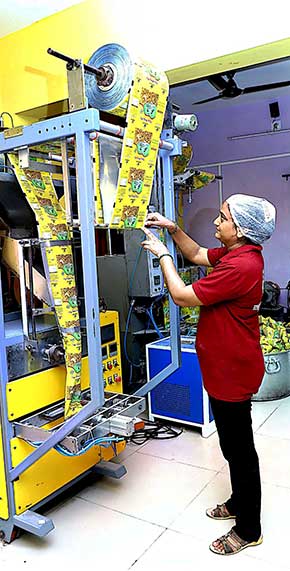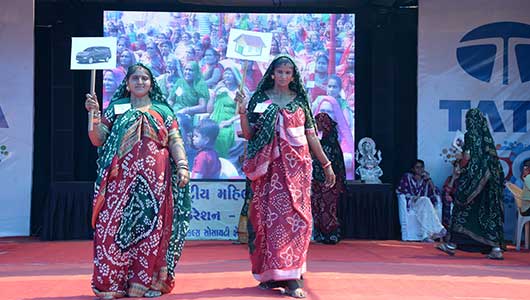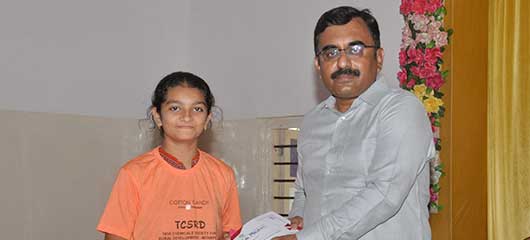This is a key cross-cutting theme in all our programmes for long term sustainability. The areas of intervention are women empowerment, reducing inequality of marginalised communities through Affirmative Action, community engagement, strengthening of Community-Based Organisations (CBOs), partnerships for achieving goals and setting up sustainable social enterprise models.


Name of Intervention: Women Empowerment-SHG
Name of Beneficiary: Puriben Manek
Location: Lalsingpur village, Dwarka district, Gujarat
When I first joined the Kalyani Mahila Mandal, I little imagined that I would become its Mukhiya one day or that I would go on to be a board member of the Gomati Farmer Producer Company and Dwarkesh Women Federation. I remember I was a shy homemaker and only joined the Mandal as my husband encouraged me to do so.
I began with meagre savings of Rs 20 a month, but this sum grew gradually as I gained confidence and acquired new skills thanks to the women empowerment programmes run by TCSRD.
These programmes taught me animal husbandry besides instilling leadership skills and even training me on the nitty-gritties of forming a federation. I began raising milch animals and selling milk, which enabled me to earn a handsome Rs 5,000 a month. Through TCSRD, I also learnt to handle bank-related documentation. I even applied for a housing loan and built a bigger home for my family. Today, I do all my banking transactions from my mobile phone even though I can drive my two-wheeler to the branch.
My dream is to launch a Women’s Bank, and I am confident I will achieve this one day soon. My journey shows that with a little support and guidance, women can accomplish great things regardless of their background.
Name of Intervention: Affirmative Action Scholarship Distribution Programme
Name of Beneficiary: Pooja Govabhai Roshiya
Location: Mithapur, Arambhada, Devbhumi Dwarka
I don’t think I would have ever aspired to be a computer engineer if the Tata Chemicals Society for Rural Development (TCSRD) had not supported me over the last four years.
My tryst with TCSRD began in 2018-19, when I was studying in Class 8 in Mithapur High School in Arambhada. I have completed my Class 12 with science currently, and live with my parents and younger brother.
Since my father, Govabhai, earns a modest income, it was always a big struggle for him to fund our education. I was good at studies and keen to get ahead in life. So, when TCSRD announced a special scholarship for children belonging to the Scheduled Castes and Scheduled Tribes, I decided to apply for it.
I visited their office to fill the application form for the scholarship. I then cleared their qualifying exam and won the TCSRD Scholarship for Special Scheduled Castes and Scheduled Tribes for 2018-19.
This was a turning point, as every year from Class 8 to Class 11, or 2018-19 to 2021-22, TCSRD deposited the scholarship amount totaling Rs.13,500 in my bank account, which I then used to buy my books and school uniforms.
TCSRD also kept us regularly informed about scholarships offered by other companies and the government. That’s how, in 2021-22, I won a scholarship from HDFC Bank, after scoring over 70 per cent marks in my exam.
I have now cleared my Class 12 exams with 75 per cent marks. My dream is to become a computer engineer and I am thankful to TCSRD for bringing me this far.
